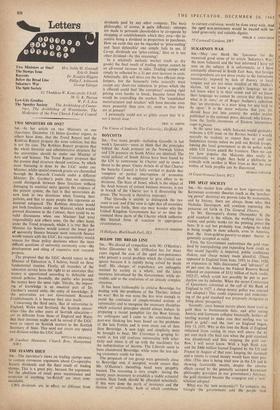BELOW THE BREAD LINE
SIR,—We should all sympathise with Mr. O'Hanlon's letter (December 6). Mr. O'Hanlon has for many years argued the case of the aged non-pensioners who present a social problem which the cynical can ignore because it is rapidly being solved by death itself. His charges of expediency are unhappily merited by society as a whole, and the latest measures introduced by the Government, while de- sirable, add to the confusion of an already complex situation.
It has been fashionable to criticise Beveridge for dealing with the, problems of the Thirties; indeed he was! But he was none the less wise enough to avoid the confusion of simple-minded notions of universality and to recognise the necessary discipline which actuarial principles should always induce. In preparing a recent pamphlet for the Bow Group, my colleagues and I came to the conclusion that post-war thinking has been based on the problems of the late Forties and is even more out of date than Beveridge. A new logic and simplicity must be brought to bear; Mr. Crossman is groping to- wards it, but still confuses universality with selec- tivity and mixes it all up with the machinery for, the redistribution of income. The Liberals seem to have abandoned Beveridge, while none the less tak- ing customary credit for him.
The proposals of our group were genuinely close to Beveridge and, if accepted, would ensure that Mr. O'Hanlon's dwindling band were properly treated. The reasoning is very simple : during the twenty years necessary to establish a viable actuarial system, State funds should be allocated selectively. If this were done the myth of insurance and the illusion of universality, both of which contribute
to current confusion, would be done away with. And the aged non-pensioners would be treated with be- lated generosity and suitable dignity.
PHILIP J. ASIAN ORM d ti e
77 Cornwall Gardens, -SW7
J it a






























 Previous page
Previous page